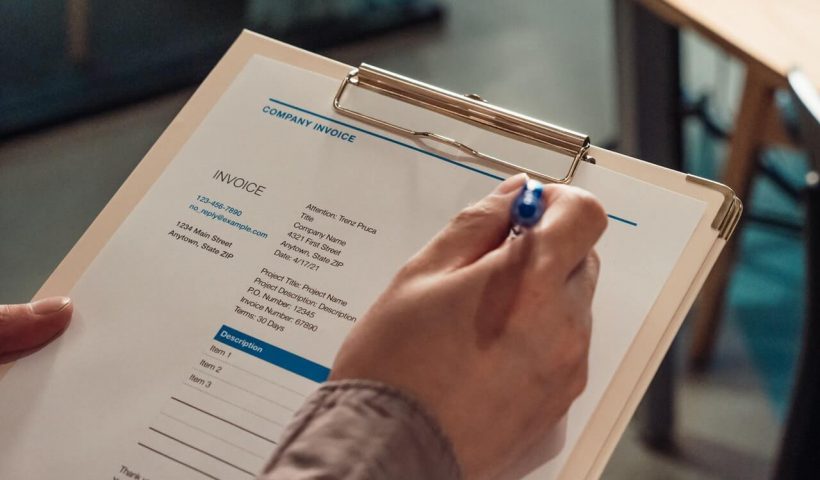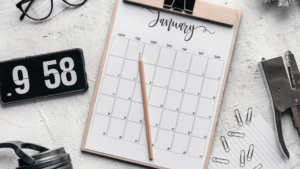What Does A VAT Invoice Require?

What is a VAT invoice and who can raise it?
VAT is one of the most important taxes in the UK. VAT invoices can be raised only by a VAT-registered business whether self-employed, owning a limited company, or a partnership. Non-VAT registered businesses cannot charge VAT on their sales and hence can’t issue VAT invoices.
If you’re VAT registered, a full VAT invoice is the default option to use for your transactions. But for some transactions, a modified invoice or simplified invoice can be issued instead. Don’t worry, we’ll go into more details about this.
For all things tax and VAT, we’ve got you covered. Some tax terms may be new or unfamiliar to you, and we get it, tax and VAT can be a confusing topic. That’s why we’ve put together this article to help you make sense of VAT invoices.
If you’re a business owner looking for someone to guide you through the logistics and legalities of running your business, our experienced team of Oxford-based bookkeepers and accountants offers practical advice on important tax subjects such as VAT invoices.
Get in touch and let’s have a chat!
What items are required on a VAT invoice?
It’s always good to be aware of what a valid VAT invoice should contain, as you may need to raise correct VAT invoices to your clients or assess whether an invoice received from your supplier is correct, otherwise, you can’t claim the VAT back from HMRC with a supplier invoice that contains incorrect information.
Full VAT invoice
VAT invoices must include:
- The name, address, and VAT registration number of the supplier
- The name and address of the person the goods are supplied to
- The date of supply and issue
- The total invoice amount (excluding VAT)
- The total amount of VAT added
- A unique invoice number
- A brief description of goods or services supplied, including the quantity of each individual item
- The price per item (excluding VAT)
- The VAT rate charged per item (if an item is zero-rated or exempt from VAT, this should be made clear)
- The rate of any discounted items
If you’re required to issue a VAT invoice, you’ll usually need to issue a full VAT invoice. But for certain transactions, you can issue a simplified or modified VAT invoice as opposed to a full VAT invoice. Modified and simplified VAT invoices are typically issued by retailers. This is because retailers mostly sell directly to consumers, and don’t generally need to issue VAT invoices. But, if a customer does request an invoice, depending on the value of the transaction, a retailer can issue modified or simplified invoices. Let’s take a look at what is required for these different types of invoices…
Invoicing software for your needs
Raising invoices has never been easier
Talk to our Oxford bookkeeping expert about invoicing software for your business
Modified VAT Invoice
You may issue a modified VAT invoice if your sale exceeds £250. The modified VAT invoice is a variation of the full VAT invoice. While it provides a lot of helpful information, there are three main elements this invoice must include. Firstly, it must show the total amount due (including VAT), secondly the net price, and last but not least, the amount of tax due.
Simplified VAT invoice
A simplified VAT invoice doesn’t provide all the detailed information that a normal full VAT invoice does but it shows what the rate of VAT is and how much it is on the total price. You can only use a simplified VAT invoice if the total value is under £250 and only needs to include the following information:
- The name, address, and VAT registration number of the supplier
- A unique invoice number
- A brief description of goods or services supplied
- The date of supply and issue
- The VAT rate charged per item (if an item is zero-rated or exempt from VAT, this should be made clear)
- The total invoice amount (including VAT)
Keeping business records if you're VAT registered
If you’re VAT registered, it’s important to keep business records. You must start keeping records when you first register for VAT, and records must be kept for at least 6 years.
Without these records, you can’t claim the VAT back and support your VAT returns.
Joanna Bookkeeping is a professional practice based in Oxford, UK, offering bespoke bookkeeping and accounting solutions that are tailored to meet your business’s needs. And because we’re fully digital, we offer services to businesses all over the UK!
If you have any questions about VAT invoices, or if you want someone with experience in this area to handle everything for you, book a call with our Oxford accounting office and let’s discover how we can support your business. We can guide you through the steps of how to raise a VAT invoice, advise you on all aspects of running your business, including how tax works, and how to make sure that everything is done correctly going forward.
Frequently Asked Questions
A VAT invoice is an invoice that can be raised only by a VAT-registered business and in comparison to a non-VAT invoice it includes an element of VAT added on top of the price for the goods or services.
A VAT registered business must issue VAT invoices to their customers. Additionally, they also need VAT invoices from their suppliers if a supplier is also VAT registered. Only with a valid VAT invoice from a supplier a business can claim VAT back from HMRC. If you're not VAT registered, you don't need a VAT invoice when you purchase things and you also can't raise VAT invoices to your clients.
A VAT receipt is a valid VAT record that can be used for VAT purposes and submitting your VAT returns. Not all businesses are required to issue VAT invoices. For example, retailers issue VAT receipts instead as an acknowledgement of payment and these can be used to claim VAT.

Your Accountant in Oxford
Oxford Office
Joanna Bookkeeping
The Wheelhouse Angel Court
First Floor, Angel Court
81 St Clements St
Oxford
OX4 1AW
Connect
joanna@joannabookkeeping.co.uk
01865 591952





